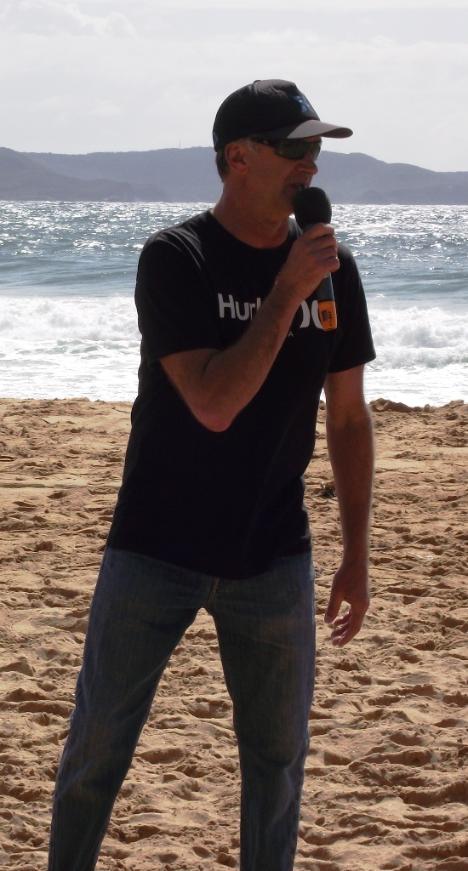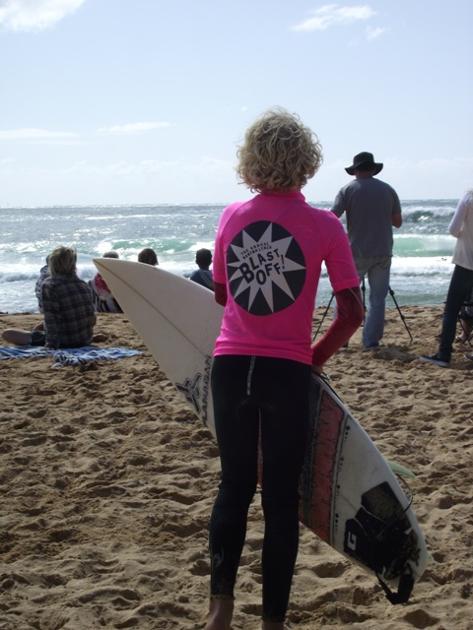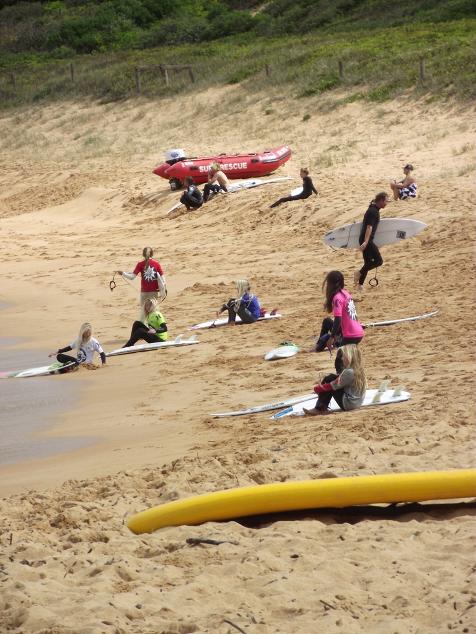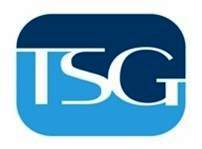October 9 - 15, 2011: Issue 27







The Surfers Group
‘For boardriders by boardriders’
It’s no secret that many who live in Pittwater are here because we have a love of the ocean. Many associated with this publication have a real passion for all elements of the water, whether the calmer waters of the estuary or any of our beautiful beaches. Fostering an understanding of those who work and live by the sea is a part of our focus, naturally. This week we wish to share an insight into one of our local organisations who have also had generations of input and passion for the ocean in what is a vital part of our iconic Australian culture, surfing.
From their website; ‘In 1997 The Surfers Group Pty Limited (TSG) was formed by 1988 World Surfing Champion Barton Lynch to create a focal point for surfing enterprise through rider development, consultancy, event and media production, positioning and marketing of products and networking. TSG is a multi faceted service provider in the board sports industry that specialises in the development of talent, consultancy and overviews of board riding culture, production of events and media, public speaking and corporate activities. The TSG Rider Development Program mentors, coaches and trains hundreds of surfers of all levels including many of the countries aspiring champions and the TSG programs include 3 day intensive camps, weekend camps, day squads, afternoon squads, Hawaii camps, private tuition, career guidance and the Corporate Day of Stoke.’
Barton (BL), can you give us an example of what or who is involved in Mentoring and fostering surfing talent and how that differs from the Consultancy side of The Surfers Group?
Laura Enever is a great current example; I’ve been coaching with Laura on and off over her career. We’ve also had a lot to do with a lot of surfers as well as other coaches who come for experience as well as the coaching ideas and perspectives. The other area for the Surfers Group beside the Mentoring and Training is the Consultancy where we use all of our contacts in the board riding Industry to help people get answers or find out things when they wish to test products or test the market on different campaigns. So this is a pretty important aspect as well.
The Training, is that just locals or people from overseas as well?
In my role with Hurley I have involvement with their international team. Last year we did a camp in Bali for their international team. Hurley has a relationship with Nike and we’ve taken our Hurley team up to the Nike headquarters at Oregon and done a whole Program of athlete testing and the like with the Hurley team there. We’ve started to utilise Nike’s sports science to help out our surfers as well. That’s been a very exciting development in things
The TSG Level 1, 2 and 3 Rider Development Programs which go from Beginners, to Intermediate to Professional levels all have aspects to highlight knowledge, mental and physical fitness to develop the person as much as the surfer. Can you tell us what is involved for the Beginners as part of the ‘Surf Fitness Program’ ?
The most important thing for a beginner is to be a good swimmer. That is the key to confidence, the key to personal safety; if you can swim well and you spend time swimming in the ocean, you get a really really good understanding of the ocean; its ebbs and flows, its movements and moods. So we always advise the people who come to do as much swimming as possible and that’s a big part of our Program.
Holly (Barton’s wife) is a personal trainer, a yoga teacher and a masseuse. Her and I combine really well. Obviously I’ve done physical training components and elements with the kids over the years but she’s been able to take that to another level of professionalism.
In Level 2, the Intermediate Program, the element termed ‘manoeuvre control’ what does that involve?
That incorporates the vital aspect of reading a wave, which really is the most important thing in surfing performance for any level of a surfer. If you’re catching bad waves or the wrong waves or not the right type of waves then you’re really not giving yourself the opportunity for growth. And so, before you even get to that, the starting point is the understanding of the ocean and growing the confidence to be out there which is what the swimming helps develop, and then you go onto the actual springing to your feet and that sort of thing, then after that, it’s the wave selection that really is the single factor in your growth and the development and speed of your growth. Once people are catching the right waves it comes down to selecting the right manoeuvres to do at the right time on the wave.
In the end it’s a form and forming art, surfing. It’s a lot like dancing, it’s a lot like music, if you don’t play it well or you’re picking the wrong notes at the wrong time or you’re not putting everything together properly then it doesn’t come across as a cohesive balanced whole.
The manoeuvre control is really picking the right moves at the right time and moving with the wave. A lot of that is considering the wave and what’s going to make the wave look good rather then having your own ambitions to do what you want to do regardless of the wave. So it’s really also about the timing of your manoeuvres and the choice of manoeuvres and controlling all of those decisions. The goal is to have it flow subconsciously so that you’re not really deliberately doing it. I think a lot of the time people are thinking too much about it; it’s driven too much by their own ambition rather then what’s going to suit the wave and this causes them to make the wrong choices and do the wrong thing at the wrong time which can result in 1. you wreck your performance and 2. you can end up getting hurt.
In the Professional level, competition drills, what does that entail, what are you trying to teach there?
When you think about surfing specifically for competition you begin to think about a management system; there’s two main issues that you’re managing. One is luck, because obviously being in a random environment that you can’t control, the strategies and the actions that you choose inevitably either open up (choosing luck for influence) the result or they close down that opportunity for luck. So one of the areas I like to work on with kids who are coming for coaching and who are competitively minded, is that management of luck and choosing the right strategy at the right time to exercise as much influence over these elements of luck as you can and Mother Nature influencing the result beyond your control.
The other thing is the management of time. It is a competitive environment with probably fifteen to twenty minute heats and you have to manage that time limit efficiently and well. So they’re the main areas in that; the management of luck and the management of time that go a long way towards deciding the result.
Another element of your training incorporates diet and food, what is an example of the kind of diet you’d recommend?
Holly has been able to help a lot in that area especially in evolving what the kids should and shouldn’t be eating. Our philosophy is in a way ‘the closer it is to the way it should be, the closer it is to its original form, wether it’s been pulled out of the earth or has just stopped breathing, the more full of nutrients it’s going to be and the more benefit it’s going to be to the person’.
The camps run for groups of people for 3 days or five days; what do they entail?
We have a whole variety of different options there. The 3 day camp takes the form of a long weekend, usually from the Friday to Sunday. We do take the coaching around and get contracted by Boardriders Clubs a lot of the time to come and do coaching for them. Some of the places we’ve been to are Avoca Boardriders, Bondi Boardriders, Mona Vale Boardriders, Stanwell Park, Bawley Point.
Boardriders Clubs are interested in getting their kids to evolve and for them it’s an investment in the future of the Club and putting some money, time and resources back into the kids. We also do these for individuals to concentrate on other areas they may want to work on. We’ve had a good relationship with the Ulladulla kids; I go down there quarterly and do camps, Port Macquarie has also been part of camp training weekends.
We also do them around home for peninsula residents. We also have kids come and do home-stay coaching with us; they come and stay at our home for the weekend and do the coaching Program.
The Mentoring Program, could you tell us about that?
This is where we work seven days a week and for 52 weeks a year to be available to mentor kids. We do that with kids that just want to be pro-surfers and also with children who have what may be termed their own personal demons or issues. They’ve been getting into a bit of trouble or haven’t been getting on with their parents. The Mentoring Program has been pretty successful in helping some of those kids get back on the right track using surfing as a positive influence in their life.
In a lot of ways I do feel like surfing is a medicine. For me especially; after dad died and we moved to Mosman when I was ten or eleven, there were a few years there where I was just roaming the streets, being a little monster and getting into a bit of trouble here and there, not necessarily doing the right things. My desire to be a professional surfer and my love for it and passion for it really saved me and got me going on the right track and really gave me a future and a life.
I think that surfing in itself is such a positive influence as something for our kids to get involved in. I know when I was a kid it was something that parents didn’t really want their kids to do. If your kid was a surfer people used to go ‘Oh really?’; but it’s gone full circle now and people appreciate and respect the culture and I suppose the career opportunities as well.
We look at surfing as a kind of medicine or form of healing.
It’s obviously physically so good for you, in the same way as yoga and meditation and those sorts of disciplines can be. It can take your mind off your problems and give the ability to focus on something, and control your mind and control your disposition and surfing has those same range of influences; you get in the water and the focus that you have to have on what is going on around you, it’s such a cleansing experience.
We try to get deep with the kids into it because to be successful you can’t just be fluffing around on the surface of what it is that you’re doing, you have to be able to absorb yourself into it and appreciate all the elements of it and let yourself get deeply into the art-form you’re involved in.
Click on logo to visit The Surfers Group Website
Blast Off 2011, Blast Off Pictures, Barton Lynch Profile

Above: Day Three of Blast Off 2011 at North Palm Beach. Below: Free surfing prior to competition, Day Three of Blast Off.

